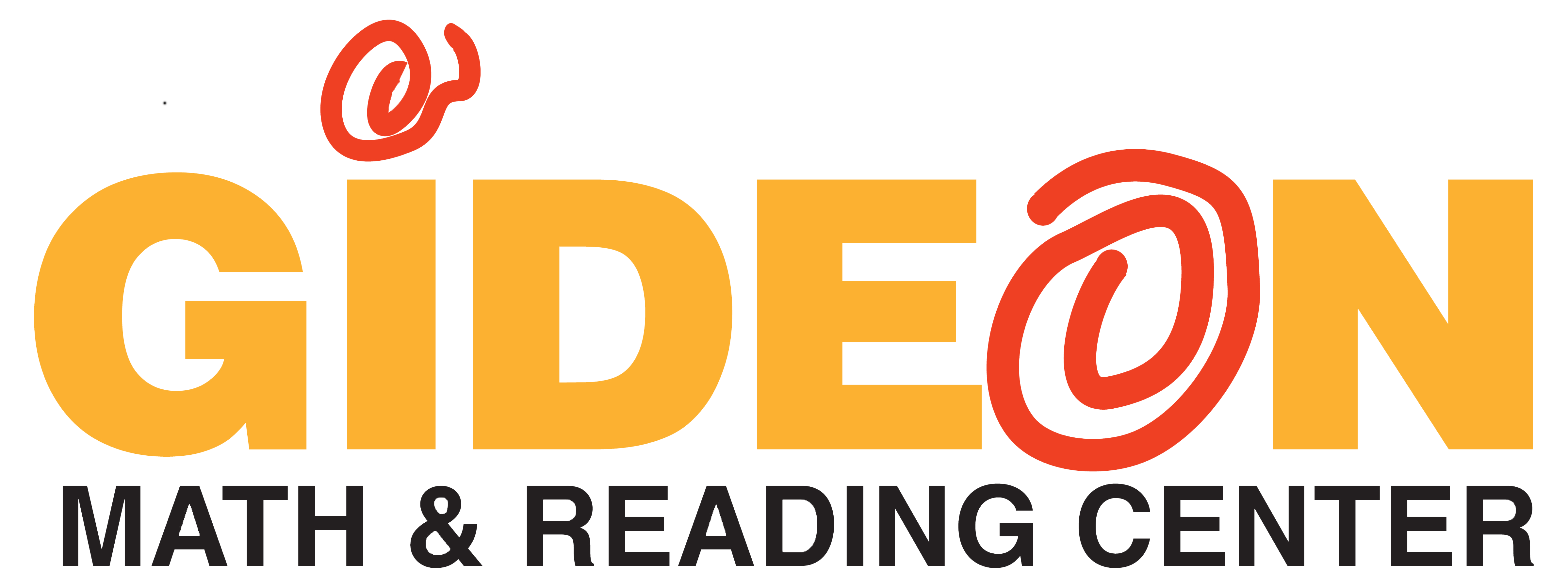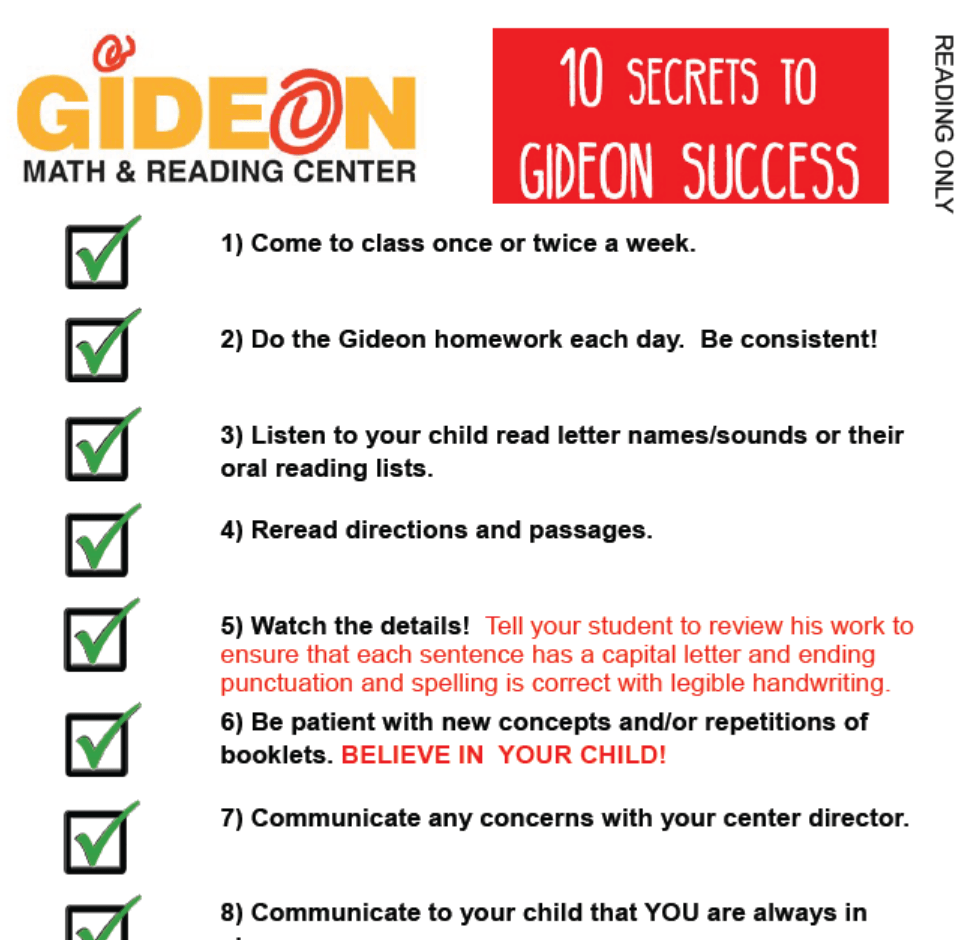
FAQs
Here are some answers to the most commonly asked questions about the Gideon Math and Reading program.
How long will it be before we see progress?
The key to speedy progress is doing the work EVERY day. Taking one day off here and there will not make much difference, but taking three days off will slow the momentum. While you will see some progress in 1-2 months with daily work, vast changes will be apparent after 6-12 months.
My child knows how to do this. Why are were starting here?
There is a large difference between knowing a concept and mastery of it. At Gideon we require mastery before further advancement in order to avoid having holes in the foundation. A child may be able to perform an operation or read a sentence, but he needs to be able to do it with speed, fluency, and without hesitation or doubt. A comfortable starting point ensures that your child will see success and progress early and helps ease in the discipline of daily Gideon homework. While you may only be concerned with the child’s grade level work, we want your child’s foundation to be solid and firm. Both math and reading build upon skills learned in previous years. How can we gain mastery of the new concepts without addressing any previous problems? Long division is terribly tedious if vertical subtraction is not mastered. With patience and discipline, your child will achieve his goals.
Why are we repeating this booklet?
In sports and piano, practice really does make perfect. Gideon work is no different! MATH DRILL: Mastery is shown with speed and accuracy. If the time and mistake standards are not met on the test, the booklet is repeated. Oral facts drill every day is best. MATH WORD PROBLEMS: Repetition is based on the total number of mistakes in the booklet. READING: For young learners in Codebusters or Word Builders, the booklets are repeated until the child knows the letter name and sound or can read the word without help For all other booklets, repetition is done at a later time for any booklet with a mistake count too high. GRAMMAR: Repetition is based on the number of mistakes and is common due to the large number of rules and small details. This tends to be a more difficult subject for most students.
What is a typical Gideon center experience for my child?
Young Learners will have a specific appointment time and will sit at a table with a student to teacher ratio of no more than 2:1. They are given extra attention for their oral reading and focusing needs. Independent Learners can drop in at any convenient time and will sit at a table with a student to instructor ratio of no more than 4:1. (Some centers may have appointments for Independent Learners.) Remember that all students are doing work specific to their starting point and performance unlike school where everyone in a grade does the same thing at the same time. MATH: Students will do an oral facts warm-up (unless still in Beginning Math) upon arrival. Then they will complete four new pages either in the math drill booklet or its test that will be timed, graded, and corrected. Afterwards, one page of math word problems will be completed. All pages in this booklet will be graded once the booklet is finished. New concepts will be explained, and once all corrections are completed, students will be sent home with enough work for daily homework until the next class. READING: Students will do four new pages in their reading booklet, and later Young Learner students will orally read a storybook if they are in Word Builders while Independent Learners may be doing grammar. All pages in the reading and grammar booklets will be graded once the booklet is completed. New concepts will be explained, and once all corrections are completed, students will be sent home with enough work for daily homework until the next class.
Why do I need to home grade my child’s math work?
Homegrading is quick and easy with our answer keys and gives your child the immediate feedback to learn from mistakes by doing corrections while the problems are still fresh. Students tend to be more focused and accurate knowing their work will be graded afterwards. Also, this is a good way to monitor and show interest in your child’s Gideon progress.
What is the best way to do Gideon work at home?
Setting aside the same time each day will help create the ‘Gideon habit’ and avoid arguments about when to do it. Remove any distractions such as TV, pets, siblings, or friends. Many children do best in the morning when they are fresh, but it may be less stressful to do it later in the day during the school year. Decide on a routine that works best for your family and stick with it each day!
How should I handle resistance?
Many children at some point will resist doing extra work using excuses such as, “None of my friends have to do this!” , “I already have good grades!” , or “This is boring!” We have heard them all! First and foremost, remember YOU are the parent, and therefore, YOU are in charge. Do not forget it! Would you allow your child to decide whether he can have candy for dinner or if he should stay up until 3 a.m. each night? Hopefully not, and do not let Gideon be any different. Rewards can help ease the Gideon lifestyle into place. Small, immediate rewards are nice for good work and attitude, and larger, long-term ones help promote a good work ethic. When a child refuses to do work, our advice is to create an immediate penalty such as taking something away he enjoys such as TV or video game time. Gideon must come before play. Do not give empty threats. You must be willing to follow through with any penalties. Remember that ultimately, this hard work will pay off - no matter what he says!
I only want to challenge my child. Why can’t she work in algebra?
First of all, the Gideon program wants to promote a strong math foundation for your child. Without mastery learning, it is difficult for most children to retain any advanced concepts. The foundation must be solid for long-term math success. If you are not going to master a concept, the child is not going to remember it.



